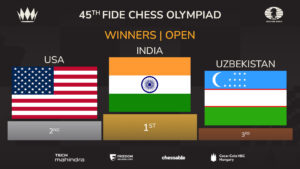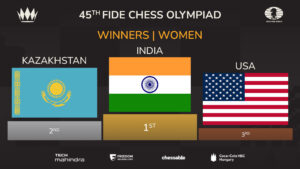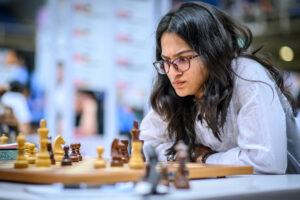India Wins Historic Gold in 45th FIDE Chess Olympiad 2024 and the Future and History of Indian Chess


Introduction
India achieved a historic win in the 45th FIDE Chess Olympiad, marking a major milestone in the country’s chess history. This first-ever gold medal victory was propelled by outstanding performances from young chess talents, particularly Gukesh D and Arjun Erigaisi. Their strategic brilliance and key wins led the Indian team to a dominant position in the global tournament. This article will explore India’s monumental victory in 2024, delve into the rich history of chess in India, and examine the future prospects of Indian chess on the international stage.
1. The 45th FIDE Chess Olympiad 2024: A Historic Win


India’s victory at the 45th FIDE Chess Olympiad is a momentous achievement that signifies the country’s growing prowess in the global chess community. The tournament, held in Budapest, Hungary, saw fierce competition from the world’s top chess-playing nations, including Russia, China, and the United States. India’s gold medal win was not only a testament to teamwork but also the exceptional individual performances of the players.
1.1 Key Players Who Made History
The triumph of the Indian team was driven by the remarkable efforts of two young Grandmasters: Gukesh D and Arjun Erigaisi.

- Gukesh D’s Role in India’s Victory:
The 18-year-old chess prodigy Gukesh D was instrumental in India’s success. In a crucial match against Russia’s Vladimir Fedoseev, Gukesh displayed aggressive tactics and achieved a commanding positional victory. His score of 9/10 points at the Olympiad secured him an individual Gold medal, highlighting his brilliance on Board one. Gukesh’s performance not only set the tone for India’s dominance but also established him as one of the brightest young talents in the chess world. - Arjun Erigaisi’s Crucial Win:
Arjun Erigaisi, another rising star, contributed significantly to India’s success. His victory over Jan Subelj of Slovenia played a vital role in solidifying India’s lead during the tournament. Erigaisi’s composed and precise gameplay in critical matches demonstrated his maturity and skill at the highest level.


1.2 Team Effort and Women’s Team Progress
While the men’s team secured India’s first-ever gold medal at the Olympiad, the Indian women’s chess team also showcased their strength. Consisting of Harika Dronavalli, R Vaishali, Divya Deshmukh, Vantika Agarwal, and Tania Sachdev, the women’s team is currently competing for their own gold medal. In a match against Azerbaijan, India leads 1-0, with hopes of achieving a double triumph in the Olympiad.
2. A Brief History of Chess in India
Chess, or chaturanga as it was originally known, is believed to have been invented in India around the 6th century AD. The game eventually spread across the world, evolving into modern chess. India’s historical connection to the game is profound, and its resurgence on the global stage in recent decades is a source of national pride.
2.1 Origins: Chaturanga and Its Global Journey
- Chaturanga: This ancient precursor to chess was played on an 8×8 grid, representing divisions of the military—infantry, cavalry, elephants, and chariots—which later became the modern pawn, knight, bishop, and rook.
- Spread to the World: From India, chess spread to Persia, then to the Islamic world, and later to Europe, where it evolved into the version of chess we know today.
2.2 The Revival of Chess in India
Chess remained a popular pastime in India, but it was not until the 20th century, with the rise of Viswanathan Anand, that India truly emerged as a powerhouse in the game.
- Viswanathan Anand’s Legacy: Anand, a five-time World Chess Champion, is credited with popularizing chess in India. His successes on the international stage inspired a new generation of Indian players and paved the way for the current wave of young Grandmasters.
3. The Future of Indian Chess
With India’s historic victory in the 2024 Chess Olympiad, the future of Indian chess looks promising. The country’s success is fueled by a robust system that nurtures young talent and offers strong infrastructural support.
3.1 Rising Stars: Gukesh D, Arjun Erigaisi, and Others
- Gukesh D: Gukesh’s triumph at the 2024 Olympiad cements his place as one of India’s brightest chess talents. With his aggressive and strategic approach, Gukesh is expected to lead India in international chess for years to come.
- Arjun Erigaisi: Arjun’s contributions to the gold medal win are a testament to his immense potential. Alongside Gukesh, he represents the new wave of Indian chess players who are challenging global giants.
3.2 Development of Chess Academies and Government Support
- Chess Academies: Numerous chess academies across India, such as the Chess Gurukul and the WestBridge Anand Chess Academy, are dedicated to identifying and nurturing young chess talent.
- Government Support: The Indian government, recognizing the potential of chess, has provided significant support in the form of sponsorships and organizing national-level competitions to ensure the growth of the game.
4. Challenges and Opportunities for Indian Chess
While Indian chess is on a high, challenges remain that could impact its sustained success.
4.1 Expanding Access to Resources
- Rural Talent: Many of India’s most promising chess players come from rural areas. Ensuring that these talents have access to training, tournaments, and financial resources is crucial for maintaining the country’s dominance in global chess.
- Sponsorship and Financial Support: Although chess is gaining popularity in India, there is still a need for increased financial backing, especially for young players who require support to compete internationally.
4.2 Competing with Global Giants
- International Competition: Despite India’s recent success, it will continue to face stiff competition from traditional chess powerhouses like Russia, China, and the United States. To maintain its edge, India must invest in both individual player development and technological tools for advanced training.
5. The Impact of Viswanathan Anand on Indian Chess
Viswanathan Anand remains a towering figure in Indian chess, and his influence is still felt today, especially in the mentorship of younger players.
5.1 Anand’s Legacy as a World Champion
- World Champion and Mentor: Anand’s legacy as a five-time world champion extends beyond his personal achievements. He has inspired and mentored many of India’s current chess stars, including those who led the country to its historic gold medal in 2024.
- Influence on Youth: Anand’s success has helped elevate chess to a mainstream sport in India, and many young players cite him as their primary inspiration for taking up the game.
6. Indian Chess on the Global Stage: What Lies Ahead
With the gold medal from the 2024 Chess Olympiad, India has solidified its place as a top contender in the chess world.
6.1 Future Global Competitions
- Consistent Presence: India is expected to maintain its presence in global chess competitions, with young stars like Gukesh and Arjun leading the charge. The future could see India hosting more international events and further enhancing its status as a global chess power.
6.2 Hosting Major Tournaments
- Hosting Opportunities: After successfully hosting the 2022 Olympiad in Chennai, India is well-positioned to host future international chess events. The country’s infrastructure and enthusiastic chess community make it an ideal destination for global tournaments.
Conclusion
India’s gold medal win at the 45th FIDE Chess Olympiad 2024 is a defining moment in the nation’s chess history. The remarkable performances of Gukesh D, Arjun Erigaisi, and the entire Indian team reflect the depth of talent and potential in Indian chess. With a rich historical legacy and a promising future, India is poised to remain a dominant force in global chess for years to come. As the sport continues to grow, both at the grassroots level and internationally, India’s future in chess looks brighter than ever.
43 UNESCO World Heritage Sites of India
Key Ministers in Prime Minister Narendra Modi’s Cabinet 3.0